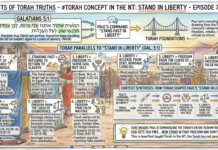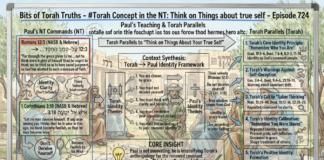Bits of Torah Truths – Torah Concept in the NT: Let No Man Lay Temptation to God – Episode 563
James 1:13
מִי שֶׁמִּתְנַסֶּה אַל יֹאמַר, ״אֱלֹהִים מְנַסֶּה אוֹתִי״, שֶׁכֵּן אֱלֹהִים לֹא יְנֻסֶּה בָּרַע וְאֵין הוּא מְנַסֶּה אִישׁ.
#torah #torahwisdom #torahtruth #torahforlife #torah4you #torahtruth
James 1:13
1:13 Let no one say when he is tempted, “I am being tempted by God”; for God cannot be tempted by evil, and He Himself does not tempt anyone. (NASB)
https://www.matsati.com/index.php/category/bits-of-torah-truths/
While James 1:13 explicitly states, “Let no one say when he is tempted, ‘I am being tempted by God,’” which is a direct theological claim, we note how the Torah lays the foundational logic for this idea through its portrayal of God’s character and the moral agency of humanity. James 1:13 Core Claim asserts two things: (i) God is morally incorruptible and (ii) God is not the source of temptation. We note the Torah parallel in Genesis 3:12 – The First Blame game, “The woman whom You gave to be with me—she gave me of the tree, and I ate.” Adam indirectly blames God for his sin: “the woman You gave me…” This is the earliest example of attributing temptation or sin to God’s providence. Note how the narrative rejects this logic becauseGod holds Adam, Eve, and the serpent each accountable. Note also Deuteronomy 8:2 – God Tests, But Does Not Entice. The Torah says God tests (nissah) Israel, and the goal is refinement, not enticement to sin. This distinction is crucial: testing reveals, but temptation entices. James likely draws on this Hebrew distinction between nissayon (test) and yetzer (evil inclination). The Torah states God is holy (Lev. 11:44–45) and not morally dualistic. Humans are morally responsible for their choices (Deut. 30:19: “Choose life…”) and Temptation arises from the yetzer hara (evil inclination), not from God. This is how the NT and James taught Torah, the Torah has not passed away!









